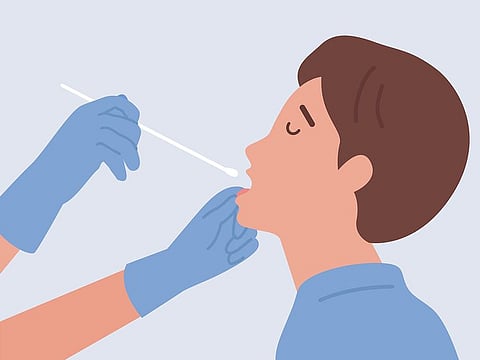Getting picked randomly for Covid test
I performed my home test on video for a very professional but friendly woman

The security check guy at Toronto Airport asked me where I was coming from and then stuck a round, pink sticker on my passport to mark that I was randomly picked for Covid testing.
“Green stickers this way, out, pink stickers to my left,” said another guy further on, standing at an exit that was beckoning me to my freedom.
Then like the ‘desi’ dad of Canadian stand-up comic, Russell Peters, I started bargaining: “Do I have to do this?” I asked an Indian-looking guy, holding an iPad. “I have taken a ton of boosters,” I said.
“Yes, you have to,” he said, politely, taking down my ID details.
Flashback to a month back, and my wife said, “They are giving booster shots to the old. Let’s get them,” she said, just as Coronavirus infections were once again rising in Bengaluru.
Elsewhere, in Delhi and the north-eastern states, it was panic time again and school holidays were being pushed forward.
Flashback even further back to December when we were freezing in an extraordinarily and unusually cold weather front in Toronto, my wife said: “Let’s get the Pfizer booster shots they are giving here.”
But getting all these shots was nothing as being extra careful as compared to our friend in Dubai who had so far taken four booster shots of various nationalities, ranging from Chinese, Russian, American, etc.
The people with pink stickers on their passports were an eclectic bunch of people who looked harried and were tired from their long flights from across various parts of the globe.
I finally read the sheet of paper the security guy gave me and which I luckily did not trash immediately thinking it was just another paper on how to wash and sanitise my hands. It said: “You have been selected for Mandatory Random Testing”, in a cheerful font that was marked in dark green.
It even had an acronym, and I was now a part of the MRT.
Being an irritatingly, persistent chap, I tried again, with the woman from the health department, who was my tester. “Do I have to undergo this? I have taken two boosters already, I am tired,” I said.
“Yes,” she said cheerfully.
“Will you be drawing blood?” I asked her.
“No, no,” she said, and laughed, “I would faint.”
She then decided to give me a self-test kit and said that I should do the test at home within 24 hours.
Nodding off in the bus, I continued reading the sheet of paper given by the security guy: “If you receive a positive test result, follow the instructions below.” And there was a warning: “If you do not comply, you will be transferred to a quarantine facility, face fines and or imprisoned,” it said.
For some crazy reason, I immediately started planning my escape.
At the peak of the unnerving second wave in Bengaluru it was common to read in the news about people vanishing from the quarantine facility as the facilities were reportedly quite disgusting.
One woman who vanished in the night was finally found hiding in another state. Even people in home quarantine started disappearing. Ten people who were sequestered in their homes escaped, but were found days later, relaxing in their “native place” and happily spreading the infection to their folks.
When they were arrested, one official proudly announced that, “Nobody can dodge the long arm of the law.”
People from India arriving in Toronto, were also found complaining vehemently of the squalid conditions in the quarantine facilities they were shoved into, and for which they had to pay.
As my bus whizzed into the night, I wondered whether I should escape to the US, but after remembering what happens in some American prisons in TV shows, I decided against it.
Three days after the deadline for doing my home test and after recovering from jet lag and after getting the wall plug adaptor for my phone and laptop, from Amazon, I called the health department and performed my home test on video for a very professional but friendly woman.
I am now waiting for the results.
Mahmood Saberi is a storyteller and blogger based in Bengaluru, India. Twitter: @mahmood_saberi



